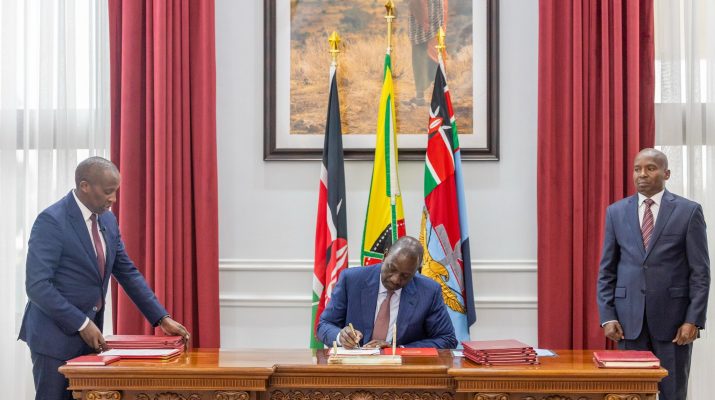By Selian Mbari
President William Ruto has officially signed into law the Conflict of Interest Bill, 2023, and the Social Protection Bill, 2025, during a ceremony held at State House, Nairobi.
The event was attended by senior government officials, including the Speaker of the National Assembly, Moses Wetang’ula, Attorney General Justin Muturi and Majority Leader Kimani Ichung’wah, who sponsored both bills.
The Conflict of Interest Act, 2023, aims to strengthen integrity and ethical standards within the public service. It repeals the Public Officer Ethics Act and provides a new legal framework governing conflicts of interest among public officers.
Under the new law, public officers will be required to:
- Refrain from participating in decisions where they or their close associates have an interest.
- Declare all financial and non-financial interests upon appointment and annually.
- Avoid engaging in contracts, business relationships, or employment that conflict with official duties.
It also grants the Ethics and Anti-Corruption Commission (EACC) expanded powers to investigate and enforce compliance. The law provides penalties for violations, including administrative sanctions and potential criminal liability.
President Ruto described the new legislation as a step forward in governance reforms.
“The enactment of a law on conflict of interest is a bold step in the war against corruption. It sets clear rules that ensure public officers serve with integrity, transparency and accountability,” he said.
The Social Protection Act, 2025, introduces a structured and rights-based approach to delivering support to vulnerable groups across the country. It establishes the National Social Protection Council, tasked with coordinating national and county programmes that target low-income and at-risk populations.
The law defines eligible beneficiaries as:
- Orphans and vulnerable children
- Persons with severe disabilities
- Older persons living in poverty
- Households affected by emergencies or disasters
- Caregivers without formal income
The law also outlines the creation of a Social Protection Fund, managed by the National Treasury, to finance the programmes. Implementation responsibilities are shared between national and county governments, with provisions for registration of beneficiaries, appeals for denied support, and regular reviews of eligibility.
The signing of both bills marks a significant legislative milestone as Kenya continues to update its legal and policy frameworks in governance and public welfare.

